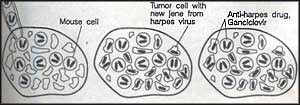US scientist uses herpes virus to fight brain tumours in rats
 SURGEONS may soon be able to call upon living micro-organisms to fight tumours that cannot be reached by the surgeon's scalpel. US scientists are proposing a new form of "molecular surgery" involving the transfer of a viral gene into the tumour and then attacking it with the anti-viral drug, ganciclovir. The technique may be approved soon for human trials.
SURGEONS may soon be able to call upon living micro-organisms to fight tumours that cannot be reached by the surgeon's scalpel. US scientists are proposing a new form of "molecular surgery" involving the transfer of a viral gene into the tumour and then attacking it with the anti-viral drug, ganciclovir. The technique may be approved soon for human trials.
Conceived and developed nearly 18 months ago by Kenneth Culver, a researcher at the National Cancer Institute (NCI), the principle involved is essentially to inject a herpes simplex virus gene into the brain cells. The herpes gene has an enzyme called thymidine kinase, which turns any cell producing it into a target for anti-viral drugs. The technique has been tried out on brain tumours in mice.
"When I first proposed this idea," said Culver, "people thought it was crazy." But the "crazy" idea may hold out a promise of life to all those with brain tumours, if human trials prove successful. The recombinant DNA advisory committee of the US National Institutes of Health (NIH) has voted unanimously to approve research into whether this new surgical method will work with human subjects, and is awaiting clearance from the Food and Drug Administration (Science Vol. 256, No. 5063).
In rats, this form of gene therapy proved surprisingly toxic to cancer cells, said Michael Blaese who heads the NCI laboratory where Culver works. But the excitement over the new technique is somewhat offset by the very real possibility of other viruses causing infection in non-cancerous body cells.
The initial trials are proposed to be conducted on cancer patients having a life expectancy of less than three months.
